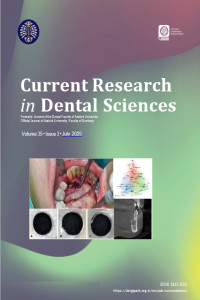hakkındaki yorumlar Diş Hekimleri ve Diş Hekimliği Öğrencilerinin Ağız Kanserine İlişkin Bilgi ve Tutumlarının Değerlendirilmesi
Abstract
To the editor,
I read the article titled ‘Evaluation of Knowledge and Attitudes of Dentists and Dental Students about Oral Cancer by Altındal D 1. I found this article enlightening and interesting. I am practicing Oral Pathology in India from last 13 years, the attitude and knowledge of the dentists and dental students is similar in India.
As frontline healthcare providers, dentists and dental students play a pivotal role in identifying suspicious lesions and initiating appropriate referrals. However, despite advancements in diagnostic technologies and treatment modalities, a gap often exists in the knowledge and confidence of dental professionals to effectively manage oral cancer concerns. Traditional lectures and textbooks are no longer sufficient to keep pace with the rapidly evolving landscape of oral cancer research. 2 Modern educational approaches embrace technology to deliver engaging and accessible learning experience.3 Interactive online modules can incorporate real life case studies, high resolution images of oral lesions and interactive quizzes to reinforce learning. Virtual reality can simulate clinical scenarios, allowing students to practice oral cancer examination and biopsies in a safe and controlled environment. Connecting students and junior dentists with experienced oral pathologists, oral surgeons and oncologists through tele-mentoring platforms facilitates knowledge transfer and provides real-time guidance on complex cases.
Keywords
References
- 1. Altındal D, Acun Kaya F. Evaluation of Knowledge and Attitudes of Dentists and Dental Students About Oral Cancer. Curr Res Dent Sci. 2025;35(1):75-82.
- 2. Shadid RM, Abu Ali MA, Kujan O. Knowledge, attitudes, and practices of oral cancer prevention among dental students and interns: an online cross sectional questionnaire in Palestine. BMC Oral Health. 2022;22(1):381.
- 3. Almubarak H. The Potential Role of Telemedicine in Early Detection of Oral Cancer: A Literature Review. J Pharm Bioallied Sci. 2022;14(Suppl 1):S19-S23.
- 4. Tanriver G, Soluk Tekkesin M, Ergen, O. Automated Detection and Classification of Oral Lesions Using Deep Learning to Detect Oral Potentially Malignant Disorders. Cancers. 2021;13:2766.
- 5. Uthoff RD, Song B, Sunny S, et al. Small form factor, flexible, dual-modality handheld probe for smartphone-based, point-of-care oral and oropharyngeal cancer screening. J Biomed Opt. 2019;24:1–8.
Comments on ''Evaluation of Knowledge and Attitudes of Dentists and Dental Students about Oral Cancer
Abstract
To the editor,
I read the article titled ‘Evaluation of Knowledge and Attitudes of Dentists and Dental Students about Oral Cancer by Altındal D 1. I found this article enlightening and interesting. I am practicing Oral Pathology in India from last 13 years, the attitude and knowledge of the dentists and dental students is similar in India.
As frontline healthcare providers, dentists and dental students play a pivotal role in identifying suspicious lesions and initiating appropriate referrals. However, despite advancements in diagnostic technologies and treatment modalities, a gap often exists in the knowledge and confidence of dental professionals to effectively manage oral cancer concerns. Traditional lectures and textbooks are no longer sufficient to keep pace with the rapidly evolving landscape of oral cancer research. 2 Modern educational approaches embrace technology to deliver engaging and accessible learning experience.3 Interactive online modules can incorporate real life case studies, high resolution images of oral lesions and interactive quizzes to reinforce learning. Virtual reality can simulate clinical scenarios, allowing students to practice oral cancer examination and biopsies in a safe and controlled environment. Connecting students and junior dentists with experienced oral pathologists, oral surgeons and oncologists through tele-mentoring platforms facilitates knowledge transfer and provides real-time guidance on complex cases
Keywords
References
- 1. Altındal D, Acun Kaya F. Evaluation of Knowledge and Attitudes of Dentists and Dental Students About Oral Cancer. Curr Res Dent Sci. 2025;35(1):75-82.
- 2. Shadid RM, Abu Ali MA, Kujan O. Knowledge, attitudes, and practices of oral cancer prevention among dental students and interns: an online cross sectional questionnaire in Palestine. BMC Oral Health. 2022;22(1):381.
- 3. Almubarak H. The Potential Role of Telemedicine in Early Detection of Oral Cancer: A Literature Review. J Pharm Bioallied Sci. 2022;14(Suppl 1):S19-S23.
- 4. Tanriver G, Soluk Tekkesin M, Ergen, O. Automated Detection and Classification of Oral Lesions Using Deep Learning to Detect Oral Potentially Malignant Disorders. Cancers. 2021;13:2766.
- 5. Uthoff RD, Song B, Sunny S, et al. Small form factor, flexible, dual-modality handheld probe for smartphone-based, point-of-care oral and oropharyngeal cancer screening. J Biomed Opt. 2019;24:1–8.
Details
| Primary Language | English |
|---|---|
| Subjects | Oral and Maxillofacial Radiology, Dentistry (Other) |
| Journal Section | Letter to the Editor |
| Authors | |
| Publication Date | July 24, 2025 |
| Submission Date | April 1, 2025 |
| Acceptance Date | May 14, 2025 |
| Published in Issue | Year 2025 Volume: 35 Issue: 3 |
Current Research in Dental Sciences is licensed under a Creative Commons Attribution-NonCommercial-NoDerivatives 4.0 International License.


